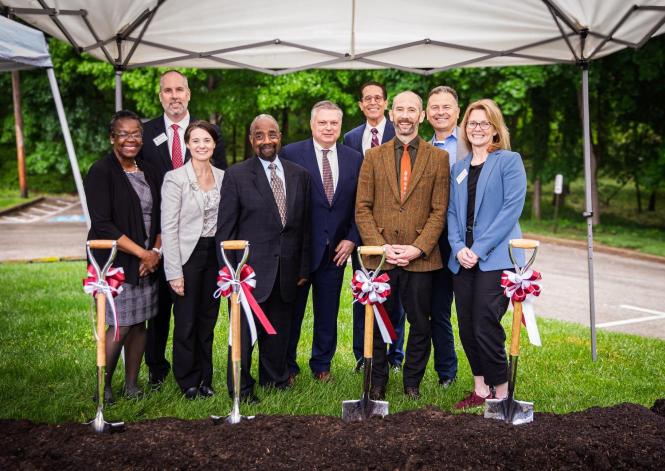
Templeton Hall Groundbreaking Ceremony
I don’t think I’ve ever quoted Winston Churchill before, but after the World War II bombing of Parliament, the British government considered rebuilding it in a modernist style and rearranging their great hall into a semi-circle that separated members to give them more working space. A rational and cheaper option. But Churchill objected with a now-famous speech in which he said, “We shape our buildings and afterwards our buildings shape us.” “We shape our buildings and afterwards our buildings shape us.” He argued that the shape of Parliament had shaped Parliament and with it the British people. And Churchill was right. A sports stadium, examination room, ice cream parlor, cathedral, library, prison, and home do not evoke the same thoughts, provoke the same feelings, or invoke the same ideas, nor do they uniformly shape the people who live within them. The builders of Europe’s cathedrals, Oxford’s spires, and America’s skyscrapers were not just building buildings. They were building the cultures that emerged from and gathered around those buildings. Because no space is neutral, but every space nurtures. And because spaces become places in which people are shaped.
And so it will be with Templeton Hall. Though Tilden, Register, and Pepper gave shape to the original Eltonwood, as it was called, and though we will have given shape to the new Templeton Hall with the architects of RLPS and the builders of Norwood, once it is finished Templeton Hall will shape us, and after us, by God’s grace, generations of students and scholars, participants and performers. And it will do so because it will materially embody our ideals, wordlessly proclaim our beliefs, and intentionally evoke some thoughts and emotions and not others.
So what ideas and beliefs will Templeton Hall embody and proclaim? What thoughts and emotions will it evoke? And what kind of culture will it create? Three things come to mind. First, community. Templeton Hall will testify to our deep commitment to formative community. It will be a home, long desired by the Templeton Honors College, because at its heart, Templeton is a community that cares about the holistic formation of its students and scholars intellectually, morally, aesthetically, spiritually, physically, practically, and socially. And we want this space to foster the kind of community within which that kind of integrated formation can occur.
And we want that because we do not believe education is simply over-priced job training for gainful employment. We believe education is holistic human formation oriented to life-long flourishing. And that kind of formation only happens in community, the kind of community this building has been designed to build. So, first, Community.
Second, Templeton Hall will silently witness to the goodness of permanence and tradition. It will articulate the college’s commitment to the collected and curated wisdom of the theologians, church fathers and mothers, philosophers, artists, musicians authors, and activists who came before us. And though they often disagree with each other and with us, their collected and curated works represent a precious endowment we steward for the present and future generations. Another line Churchilldrops in that speech is that “Logic is a poor guide compared with custom,” and again he’s right if by logic he means calculating analysis or critical thinking bound to the shifting sands of the present compared to the sifted wisdom of the ages for which nothing is new under the sun. And so Templeton Hall testifies to the goodness of permanence and tradition.
Finally, Templeton Hall will embody our belief in the enduring goodness of Beauty. And so it will have an art gallery and recital hall. And it will be a home for the Honors College, whose students sing in a mandatory two semester chorale and take a course in Beauty & the Arts, and we’ll share it with the Performing Arts Division that includes music, theatre, and dance, and perhaps one day the Fine Arts. We are committed to this because Beauty and the arts remind us we are made in the image of an incarnate God who creates and loves beauty, because Beauty and the arts are inextricably human, created by every culture across space and time, and because Beauty brings refreshing delight to our weary souls.
The long tradition of Christian liberal arts education is woven together by four enduring ideas: the true, good, beautiful, and holy. Eastern’s commitment to faith, reason, and justice capture in their own way three of those—faith speaks to the holy, reason to the true, justice to the good—but there’s also the Beautiful, which didn’t make it into Dr. Black’s triad. Despite that, the beautiful is present at Eastern, even if not as regularly named, in our ponds and trees and some of our buildings, in our Arts Division and ensembles, in the liturgical arts of our worship teams, in the literature our students read, in the notes drifting out of the President’s piano on a Tuesday afternoon. With Templeton Hall we expect the Beautiful to silently raise its voice even further through the Beauty embodied, performed, and displayed within it.
So. “We shape our buildings and afterwards our buildings shape us.” How do we want our souls, our students, and our university shaped? That’s the question we had to ask before we ever designed this building. And Eastern University answered it by saying we want our souls shaped by warm Community and wise Tradition and winsome Beauty. And for that, I’m grateful. Because these are good for us, good for our students and city, and good for the world God calls us to love.
So, as dean of both the Templeton Honors College and the College of Arts & Humanities, at least for the next few weeks, and on be half of both colleges, let me express our deep gratitude to President Matthews, Provost Sparks, Board Chair Steve Clemens and the entire Board, VP Luisa Wilsman, VP Trevor Jackson, Dr. Steven Ford, and the alumni and friends of the Honors College and the Performing Arts for embracing this vision of Templeton Hall, a space that will become a place that shapes our souls.
Dean Brian A. Williams
May 10, 2024








